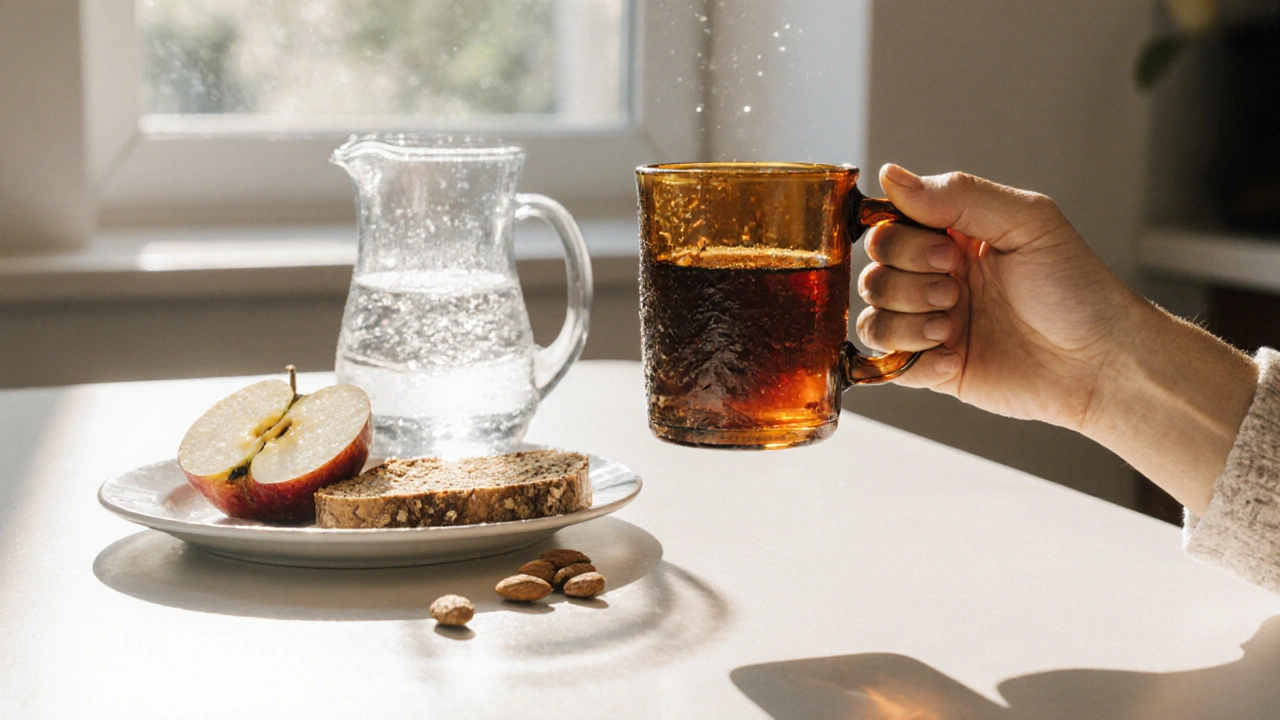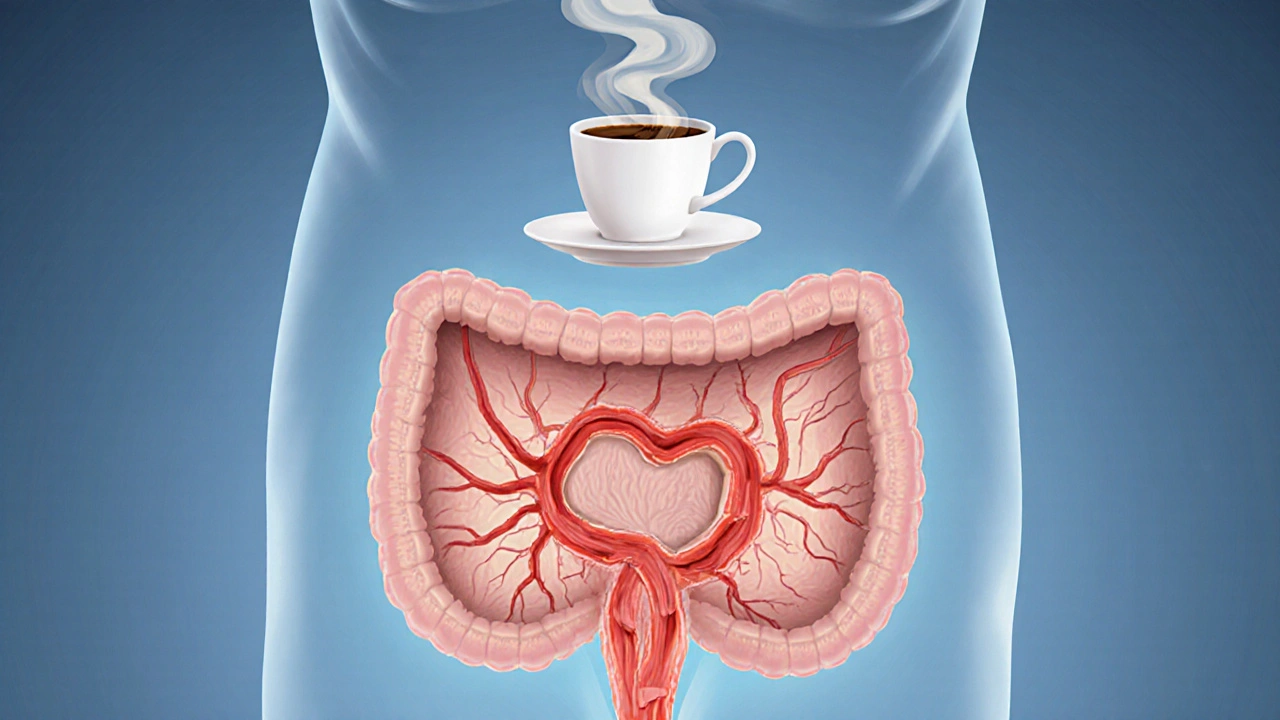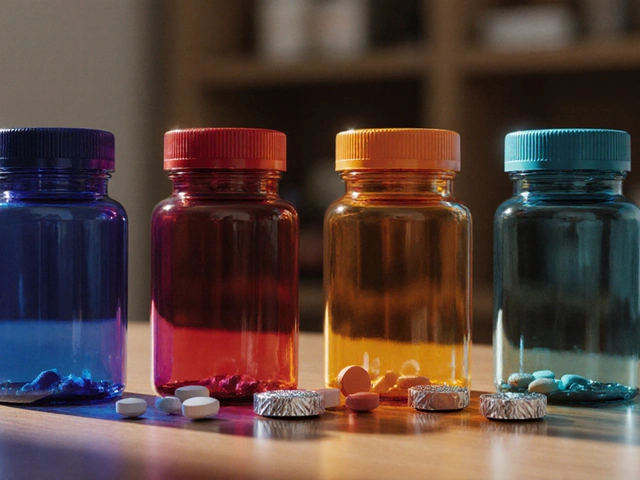Coffee & Hemorrhoids Symptom Checker
High-Caffeine Coffee
(< 150 mg/serving)
May increase blood flow and cause dehydration
Low-Caffeine / Decaf
(< 15 mg/serving)
Generally better tolerated for hemorrhoid sufferers
Select the statements that apply to your coffee consumption:
Your Coffee Impact Analysis
Ever wonder if that daily cup of joe is making your hemorrhoid flare‑ups worse? You’re not alone. Many people with hemorrhoids notice a pattern: symptoms spike after a strong coffee, then ease off later in the day. This article breaks down exactly why caffeine can tug at your rectal veins, what you can do to keep comfort high, and when it’s safe to keep sipping.
Quick Takeaways
- Caffeine can increase blood flow to the anal area, heightening swelling.
- Dehydration from coffee may harden stools, adding strain.
- Low‑caffeine or decaf options, paired with extra water and fiber, often ease symptoms.
- Watch for other triggers-spicy foods, prolonged sitting, and heavy lifting.
- If bleeding or severe pain persists, seek medical advice promptly.
Hemorrhoids are swollen veins in the rectum or anal canal that can cause itching, pain, and occasional bleeding. They affect roughly 13% of adults worldwide, with prevalence rising after age40.
How Caffeine Works in the Body
When you pour a hot brew, you’re not just adding flavor-you’re introducing a potent stimulant. Caffeine belongs to the methylxanthine family and works by blocking adenosine receptors, which normally tell the brain to relax. The result is a burst of alertness, faster heart rate, and increased production of certain hormones like adrenaline.
Two side effects are especially relevant to hemorrhoids:
- Vasodilation and blood‑pooling: While caffeine narrows some blood vessels, it also triggers a rebound effect that can expand the veins around the colon and rectum. This extra blood volume can exacerbate the swelling already present in hemorrhoidal tissue.
- Dehydration: Caffeine is a mild diuretic. If you sip a large latte without replacing the fluid loss, stool consistency can become dryer and harder, making bowel movements more strenuous.
Why Coffee Can Trigger Hemorrhoid Symptoms
Beyond the chemistry, the habit of drinking coffee can influence lifestyle factors that matter for hemorrhoids.
- Timing: Many people reach for coffee first thing in the morning, right when the bowel is most active. A sudden urge combined with harder stool can create extra pressure on the anal veins.
- Acidity: Hot coffee is acidic (pH4-5). For some, this can irritate the lining of the gastrointestinal tract, leading to subtle inflammation that trickles down to the rectal area.
- Temperature: Very hot beverages may cause temporary dilation of blood vessels in the digestive tract, adding to existing swelling.
Comparing Coffee Types: High‑Caffeine vs Low‑Caffeine
| Attribute | High‑Caffeine (< 150mg/serving) | Low‑Caffeine / Decaf (< 15mg/serving) |
|---|---|---|
| Blood‑flow impact | Stronger vasodilation, higher risk of swelling | Minimal effect |
| Diuretic effect | Noticeable increase in urine output | Negligible |
| Stool hardness (if water not increased) | Higher chance of dry stools | Less impact |
| Overall comfort for hemorrhoid sufferers | Potential aggravation | Generally better tolerated |
Switching to low‑caffeine or decaf coffee can cut the aggravating factors in half while still letting you enjoy the ritual.

Practical Steps to Enjoy Coffee Without Worsening Hemorrhoids
- Hydrate aggressively: For every 8‑oz cup of coffee, drink at least 12‑oz of water. This offsets the diuretic effect and keeps stools soft.
- Boost dietary fiber: Include 25-30g of fiber daily from sources like oats, berries, beans, and leafy greens. Fiber adds bulk and moisture to stool, making it easier to pass.
- Time your coffee: If you’re prone to morning urgency, have coffee after you’ve already had a bowel movement, or limit intake to mid‑day when the colon is less active.
- Choose milder brews: Cold brew or drip coffee generally contains less caffeine than espresso‑based drinks.
- Mind the temperature: Let hot coffee cool to a lukewarm level (< 60°C) before drinking to avoid thermal irritation.
- Avoid add‑ons that dehydrate: Skip sugary syrups and excess alcohol, both of which can further dry out the lining.
Combine these habits with regular gentle movement-short walks after meals-and you’ll notice fewer flare‑ups.
When Coffee Might Still Be a Problem
Even with adjustments, some people remain sensitive. Keep an eye on these red flags:
- Persistent bleeding after bowel movements.
- Pain that doesn’t improve after a warm sitz bath.
- Swelling that doesn’t shrink within a couple of days.
- Increased frequency of nighttime trips to the bathroom.
If any of these appear, pause coffee completely for a week and see if symptoms recede. If they do, caffeine was likely a trigger.
Medical Options If Lifestyle Tweaks Aren’t Enough
When diet and caffeine control fail, physicians may suggest over‑the‑counter remedies like topical NSAIDs for pain, or stool softeners containing docusate sodium. In more severe cases, minimally invasive procedures such as rubber band ligation or infrared coagulation can shrink the veins. These options should only be pursued after a professional evaluation.
Bottom Line: Moderation Meets Mindfulness
Coffee itself isn’t a death sentence for hemorrhoids, but the combination of caffeine‑driven dehydration and vascular changes can turn a comfortable day into a painful one. By hydrating, upping fiber, and choosing low‑caffeine brews, you can keep the ritual without paying for it in discomfort.
Frequently Asked Questions
Can decaf coffee still cause hemorrhoid flare‑ups?
Decaf has a fraction of the caffeine, so the vasodilation and diuretic effects are much weaker. Most sufferers find decaf harmless as long as they stay hydrated and maintain fiber intake.
Is the acidity of coffee a real risk for hemorrhoids?
Acidity can irritate the gut lining, but it rarely reaches the rectal veins directly. The main concern is when acidity leads to bowel irregularities; buffering coffee with milk or choosing low‑acid blends can help.
How much water should I drink with each cup of coffee?
Aim for at least 1.5× the volume of your coffee. For an 8‑oz cup, sip about 12oz (350ml) of water within the same period.
What foods should I pair with coffee to protect my bowels?
High‑fiber snacks such as an apple with skin, a handful of almonds, or a slice of whole‑grain toast provide bulk and moisture, counteracting coffee’s drying effect.
When should I see a doctor about hemorrhoid pain?
If bleeding continues for more than a few days, pain is severe, or you notice a lump that doesn’t shrink, schedule a medical appointment. Early treatment prevents complications.



Kyle Garrity
4 October / 2025Man, I feel you on the coffee‑hemorrhoid struggle. It’s rough waking up, grabbing that hot cup, only to wonder if it’s turning your day upside down. The diuretic effect can really dry out stools, and the extra blood flow doesn’t help the already swollen veins. I’ve found that swapping one of my morning brews for a decaf and chugging a glass of water right after makes a noticeable difference. Also, loading up on fiber – think oats, berries, and a handful of nuts – keeps things moving smoothly. Give it a try and see if the flare‑ups calm down over a week.